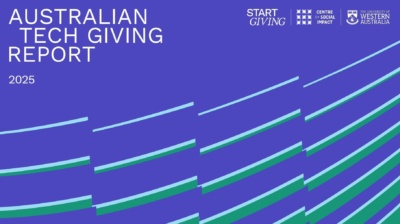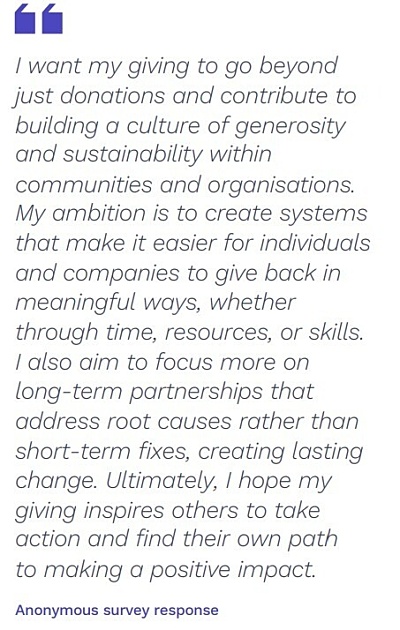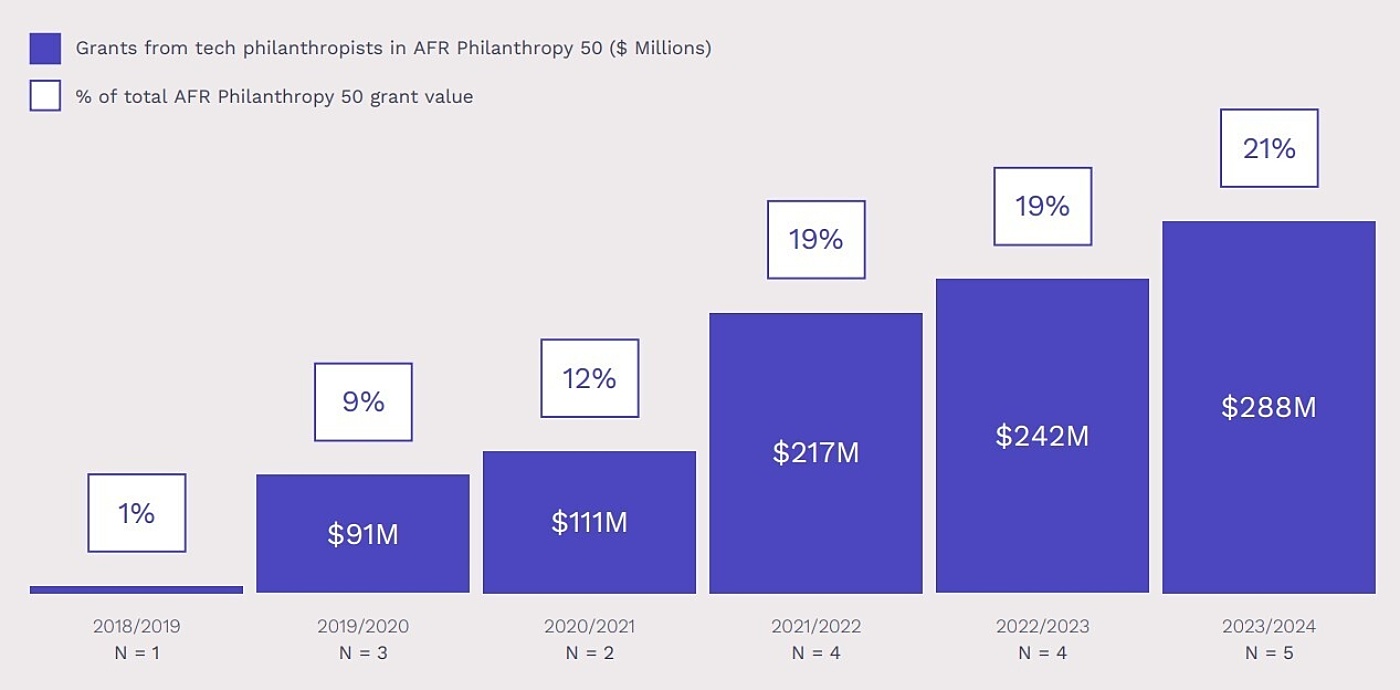
Attention governments: There’s more to giving out grants than handing over the money
Posted on 18 Feb 2026
Around 50 per cent of all funding for charities in Australia comes from government. The nature of…
Posted on 02 Jul 2025
By Greg Thom, journalist, Institute of Community Directors Australia

Australia’s wealthy tech titans are set to revolutionise the philanthropic landscape, according to a new report.
The study revealed that the entrepreneurial founders of successful start-ups in the tech community are more likely to give and give more than those who inherited their wealth, and give differently.
The Australian Tech Giving Report was released by tech community focused not-for-profit StartGiving and the Centre for Social Impact at the University of Western Australia.
They said the report provides the first comprehensive benchmark of philanthropy in Australia's rapidly growing tech sector, which is projected to contribute $250 billion a year to Australia's GDP by 2030.

The report found:
Just a handful of the nation's top 30 wealthiest tech entrepreneurs already donate more than $19 billion through philanthropy, and the report found this could potentially be boosted by a further $6 billion.
Australian tech investor Daniel Petre, founder and chair of StartGiving, said the tech sector is uniquely positioned to unlock a new era of giving.
"Australia's growing tech sector has clear, untapped potential for more and greater giving, driven by a new generation of self-made tech founders,” he said.
“Impact-driven, comfortable with risk, people-oriented, and highly collaborative, tech givers' contemporary giving styles could revolutionise what it means to be a philanthropist in Australia.”

“This shift in approach has the potential to fundamentally rebalance the power dynamics of giving.”

The cause most commonly supported by tech start-up founders was improving health (62.7 per cent), followed by social or public welfare (57.3 per cent), education (56.0 per cent), promoting or protecting human rights (45.3 per cent), and protecting the environment (30.7 per cent).
The research found that tech founders exhibit a different relationship with wealth than those in traditional sectors.
Many of those who took part in the survey cited luck as a significant factor in their success and expressed discomfort with their wealth.
The report suggested that tech philanthropy will continue growing in both scale and sophistication, potentially transforming not just how much is given, but how it's distributed.
Who are tech givers and why do they give?
As self-made entrepreneurs with community-oriented mindsets, tech givers were often shaped by early volunteering experiences. They recognise luck’s role in their success and view wealth as a responsibility rather than entitlement.
When do founders give?
Early-stage tech start-up founders typically volunteer or donate ad hoc before later turning to structured philanthropy. Financial milestones often occur while tech start-up founders are younger than traditional wealth creators, delivering both the means and opportunity to focus on giving. Tech givers emphasise addressing societal challenges now, rather than waiting until they are older.
What are the barriers to giving?
Australia’s underdeveloped philanthropic culture favours giving privately, with “tall poppy syndrome” discouraging open discussions about wealth and philanthropy. Despite challenges such as media scrutiny and perceptions that social issues are government responsibilities, many tech founders recognise that sharing stories about their giving is important and will build a healthier philanthropic culture.
How do tech givers give?
Tech givers apply entrepreneurial principles to philanthropy, embracing experimentation with optimism. They tackle pressing global issues by backing talented individuals and teams rather than specific projects, reflecting venture capital principles. Founders like to apply their business acumen and natural problem-solving skills to social challenges, while collaborating with experts on the ground to maximise their impact.
How tech giving differs from traditional philanthropy?
“Structured giving” represents consistent, proactive philanthropy rather than specific legal structures. Tech founders establish foundations primarily to manage windfall income and create “forcing mechanisms” for giving commitments.
Many tech donors prioritise creating measurable impact through their giving over family legacy, tax benefits or personal recognition. Compared to the general population, tech givers show significantly higher interest in environmental causes, human rights, and reconciliation initiatives, and more trust in not-for-profit effectiveness.
Future giving intentions
Over half (57.7 per cent) of Australian Tech Giving Survey respondents expect to increase giving next year, with about one-fifth planning to establish foundations. Many aspire to build “a culture of generosity” through long-term partnerships addressing the root causes rather than the symptoms of disadvantage.
What’s the opportunity?
It is estimated that the 30 wealthiest people in the tech sector could contribute up to $25 billion to philanthropy. A collaborative culture that includes openly sharing lessons learned and stories can help extend the movement beyond
ultra-wealthy founders and create a supportive environment for new philanthropists.
Tech givers’ innovative practices backing people over projects, providing unrestricted multi-year grants, and empowering nonprofit leadership could transform not just how much is given in Australia, but also how it’s distributed.
Source: Australian Tech Giving Report

Centre for Social Impact CEO Arminé Nalbandian said tech founders are bringing an entrepreneurial mindset to philanthropy, backing people over projects, offering flexible multi-year funding, and prioritising impact over recognition.
“This shift in approach has the potential to fundamentally rebalance the power dynamics of giving.”
StartGiving was founded in 2022 with the aim of creating a culture of giving in Australia inspired by the philanthropy of US tech leaders such as Microsoft founder Bill Gates, who also sit's on the NFPs advisory board.
StartGiving CEO Antonia Ruffell described tech givers as “action oriented.”
“Often with the means to give earlier in life, they’re motivated to start their philanthropy earlier, not decades down the track,” she said.
“We hope this report will inspire and encourage more tech founders with the means to start giving now.”

Posted on 18 Feb 2026
Around 50 per cent of all funding for charities in Australia comes from government. The nature of…
Posted on 18 Feb 2026
You wouldn’t try to fix a complex system with one tool. You’d widen the toolkit, improve the…

Posted on 18 Feb 2026
Australia’s champion laundry van charity, Orange Sky, has announced it is ready to expand into…

Posted on 18 Feb 2026
To have any hope of hitting the grand plan of doubling philanthropy by 2030, Australia needs one…

Posted on 18 Feb 2026
When Nyiyaparli woman Jahna Cedar travels to New York next month as part of the Australian…

Posted on 17 Feb 2026
This is the full academic version of Dr Oksana King's thoughts on the need to better compensate and…

Posted on 12 Feb 2026
Our special NFP trends report distils the views of more than two dozen experts.

Posted on 11 Feb 2026
The ballooning cost-of-living crisis is affecting Australian families to the extent that many…

Posted on 11 Feb 2026
Rev. Salesi Faupula is the Uniting Church’s moderator for the synod of Victoria and Tasmania. Born…

Posted on 11 Feb 2026
Service providers have expressed cautious support for the federal government’s Thriving Kids…

Posted on 11 Feb 2026
Australia’s not-for-profits need strategic investment by the federal government to support the…

Posted on 11 Feb 2026
For the first time, charities commissioner Sue Woodward has confirmed the Australian Charities and…